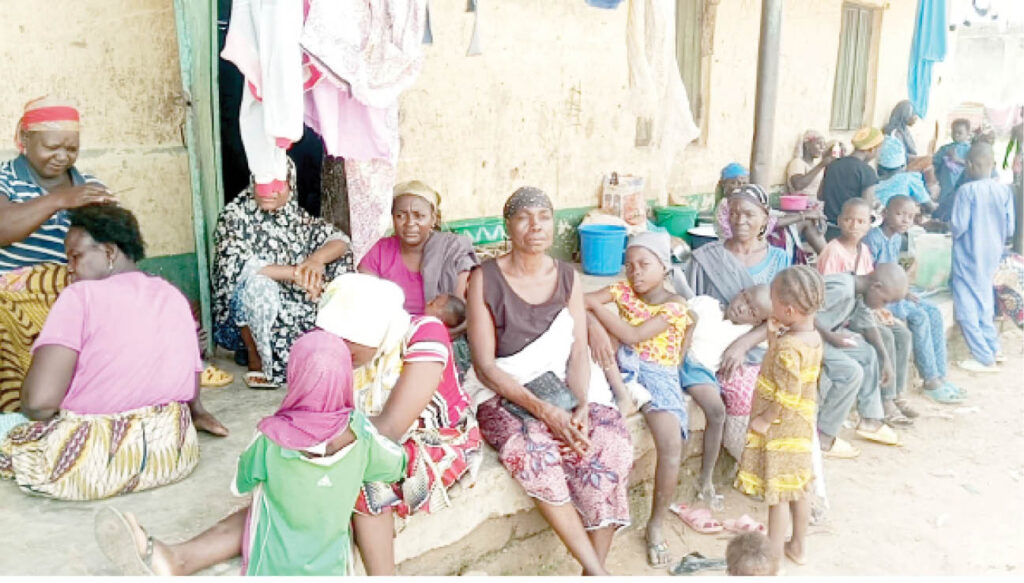
Across Benue, Katsina and Niger states, classrooms have turned into safe haven for internally displaced persons pushed out of their homes due to rising onslaughts by bandits. For thousands of children in these states, education has been put on hold as their schools now double as shelters for displaced persons. With no clear end in sight, the fate of an entire generation hangs in the balance, raising urgent questions about the future of learning in conflict-hit communities, Weekend Trust reports.
In Benue State, the fate of many school-age children hangs in the balance as victims from rural communities ravaged by armed invasions take over educational facilities for shelter.
Our correspondent reports that many displaced persons across crisis-torn local government areas, including Guma, Logo, Agatu, Kwande, Gwer West, Apa and Makurdi, have sought refuge in classrooms, disrupting school activities.
A parent, Anita Ikyur, said the NKST Primary School, in Logo Local Government Area had long been inhabited by IDPs from the troubled areas, such that there has been the absence of academic activities in these schools for the five past years.
Worried that academic activities have been suspended for pupils these years because their classrooms are now take over, she said, “The IDPs are using the school buildings. They live there, so learning hasn’t been going on. It is a worrisome development that government must look into as only those who have money to register their children in private schools within the town are getting educated while those of us who do not have the means leave our children at home.”
Another parent, Mande Achagh, said the situation was worse in his Agagbe community of Gwer West Local Government Area, where many displaced persons take shelter in camps, schools and other communities.
“The situation is bad in Gwer West and affecting schooling seriously. I expect the government to look into this challenge by finding alternative shelters for the displaced people so that our children can return to their classrooms.
“The future of these children hanging academically is not right. I feel bad because in some cases, the children learn under the trees while others have stopped schooling completely,” Achagh said.
Jacintha Terhemen, a secondary school student in the recently attacked Yelwata community of Guma Local Government Area, said although her school was not taken over, the primary school classrooms in the area were being shared with displaced people.
“It is affecting learning because pupils can’t properly access their classrooms. I feel sad about the situation and I think the government should do something about this urgently,” she said.
An educationist, Ernest Adanu, warned that the continued occupation of schools by IDPs in Benue posed grave implications for the future of children’s education.
Adanu said the development had led to disruption in learning, overcrowding and a decline in the quality of education across the affected communities.
“When classrooms are converted into shelters, children are automatically denied access to learning. This does not only widen the gap in literacy and numeracy but also increases the risk of long-term school dropouts,” he said,
He further explained that prolonged closure of schools due to displacement erodes children’s interest in education, exposes them to child labour and early marriage, and could worsen insecurity in the long run as out-of-school youths become vulnerable to criminal activities.
Adanu advised the government to fast-track the construction of temporary shelters for IDPs and ensure that children return to school without delay, adding that urgent collaboration with international development partners is necessary to prevent a collapse of education in the state.
Meanwhile, the State Emergency Management Agency (SEMA) said the government was making a headway to address the situation with collaboration of the International Organisation for Migration (IOM), European Union (EU) and other foreign bodies.
The agency disclosed that talks were ongoing about the funding to expand support and help to implementing the recently launched durable solutions to address urgent needs, such as shelter, food security, health care and essential services for IDPs.
The programme manager of IDPs at SEMA, Zege Orseer Gaius, also told our correspondent that the agency was working hard to relocate displaced persons from school buildings so that pupils and students could go back to their classrooms.
“We had started work before now. In Gwer West, most of the IDPs are in school buildings, particularly in Naka and Agagbe, where they are in primary schools.
“We have started discussions with the IOM on a programme to build temporary shelters everywhere. That was why we moved some IDPs from the markets and beside housing estate in Makurdi to the mega shelter provided by IOM. We are working towards more of such shelters so that children can freely attend school. In some places, children are still able to go to school where the IDPs occupy open fields in the premises, while in others they are not going to school at all.
“At Ugba in Logo and Ortese in Guma camps, schools still operate side by side with IDPs who use some classrooms. The Benue State Government has launched an action plan for durable solutions to resettlement, but the protocol is extensive. The plan is in place, and the government is seeking funding through the UN, EU, and other foreign partners to implement it. The project is estimated at N1 trillion, so it is huge and consists of all infrastructure that will finally rest these challenges.
